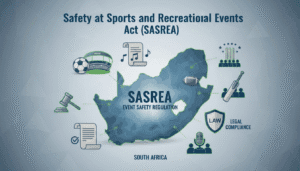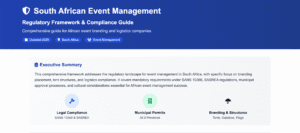Managing corporate events can seem like an overwhelming task to handle. Did you know that the success of these events can significantly impact your company’s reputation and brand image? This blog post is here to help, offering tips on everything from planning and executing effective events, to dealing with the challenges along the way.
Let’s jump right into taking your corporate event management expertise up a notch!
Key Takeaways
- Corporate event planning involves coordinating business events such as product launches, conferences, and team building activities.
- Different types of corporate events include business conferences, workshops, exhibitions, corporate retreats, award ceremonies, incentive trips, charity events, product demonstrations and team-building exercises.
- Challenges in corporate event planning include understaffed events, sticking to a budget, finding the right venue and ensuring attendee engagement and communication.
- Best practices for successful corporate event management include setting clear objectives, allocating a realistic budget with cost estimation being crucial. Develop a comprehensive marketing plan to attract attendees and sponsors while monitoring attendee experience through feedback collection.
What is Corporate Event Planning?
 Corporate event planning centres on the coordination of business events. These occasions range from product unveilings and professional conferences to team bonding activities. With a keen focus on stakeholder engagement, corporate event planning is integral to enhancing customer attraction and strengthening customer relationship management.
Corporate event planning centres on the coordination of business events. These occasions range from product unveilings and professional conferences to team bonding activities. With a keen focus on stakeholder engagement, corporate event planning is integral to enhancing customer attraction and strengthening customer relationship management.
Planning such an event requires meticulous organisation skills and a detail-oriented approach. The ultimate aim of these corporate events lies in fostering business growth, attracting new customers while fortifying relations with existing ones.
A successful venture into this line of work not only demands strong organisational abilities but also effective communication skills.
Types of Corporate Events

Small, midsize, and large events are the different categories of corporate gatherings.
Small, Midsize, and Large Events
Corporate events can vary greatly in size and purpose. Small internal gatherings may be simple celebrations or team building activities, yet these still require good planning to ensure their success.
Attention to details such as the venue, attendee list and catering makes all the difference for small-scale corporate functions.
Scaling up to midsize and large business gatherings, more complexities arise. Trade fairs, seminars, product launches or large-scale conventions often involve hundreds of attendees including staff members, customers and vendors.
These larger events demand enterprise technology tools to manage various tasks from booking hotel rooms for delegates, organising flights if necessary and keeping tight control on budgets.
Virtual formats are becoming popular too; online conferences or webinars facilitate networking without the travel logistics involved in traditional physical events.
Different Types of Corporate Events
In the corporate world, various events exist, each serving a specific purpose and contributing to the overall success of businesses. Here are nine common types of corporate events:
- **Business Conferences:** These larger gatherings often involve pertinent industry topics, guest speakers, and networking opportunities.
- **Workshops:** Smaller in size but focused on skill or knowledge enhancement, workshops aim for deeper understanding and hands-on experience.
- **Exhibitions:** Businesses showcase their latest products or services at these events, hoping to attract potential clients or partners.
- **Corporate Retreats:** These getaway events promote relaxation while strengthening team bonds through various activities.
- **Award Ceremonies:** Recognizing employees’ hard work and achievements boosts morale and promotes a healthy competitive environment.
- **Incentive Trips:** Rewarding high-performing employees with all-expense-paid trips bolsters loyalty and motivation within the company.
- **Charity Events:** Through these initiatives, companies demonstrate social responsibility while fostering a sense of community solidarity.
- **Product Demonstrations**: Such events focus on introducing new products to the market effectively through demonstrations and interactive experiences.
- **Team-building Exercises**: In-house activities that enhance teamwork skills contribute significantly to overall productivity improvements.
Challenges of Corporate Event Planning
Corporate event planning can be challenging due to factors such as understaffed events, sticking to a budget, finding the right venue, and ensuring attendee engagement and communication.
Understaffed Events
Understaffed events pose a unique set of challenges for corporate event planning. A shortage of staff can create workload pressure and cause a scramble to meet deadlines on the day of the event.
Staffing shortages often lead to rising costs, including unexpected increases in employee salaries, benefits, and hourly wages. Consequently, this lack of sufficient staffing may result in overspending or even a budget deficit for the event.
Furthermore, low attendance may occur due to inadequate staff resources causing interruptions that distract guests’ attention from fully engaging with the event’s activities or presentations.
Therefore it is essential for successful corporate event management to adequately address potential understaffing issues before they affect both guest experience and overall budget management.
Sticking to Budget
Managing financial constraints becomes an uphill task in corporate event planning. With insufficient funds being a routine hurdle, it calls for meticulous cost estimation to avoid overspending issues.
The task of setting and managing budgets comes with its share of difficulties, often recognised by seasoned professionals as the most challenging part of their job.
Rising expenses coupled with tight funding limitations put event planners under immense pressure. However, budget management is crucial for successful events and therefore cannot be overlooked or undermined.
Expertise in handling tight budgets while ensuring all necessary costs are covered is an indispensable skill in the world of corporate events.
Finding the Right Venue
Choosing the ideal venue is a crucial step in planning successful corporate events. A suitable location can set the right tone, making all the difference in creating an inviting atmosphere for attendees.
It involves a keen evaluation of factors such as capacity, accessibility and available amenities. Extensive research on potential venues helps to overcome challenges related to suitability and ensures smooth event management.
Furthermore, effective communication with stakeholders minimises potential obstacles during this selection process. The task can seem daunting at first but with thorough preparation and clear objective setting, pinning down the perfect venue becomes less complicated.
Attendee Engagement and Communication
Keeping attendees engaged and connected is a significant hurdle in corporate event planning. Utilising interactive communication methods can play a vital role in enhancing attendee engagement, stirring conversations, and stimulating participant involvement.
Collaborative networking channels such as online forums provide a platform for fostering attendee connectivity beyond the physical confines of the event.
Promoting attendee involvement requires more than just providing an engaging agenda; it calls for an active strategy from the organising team to ensure ongoing interaction throughout the event.
Tools like live polls and Q&A sessions help facilitate participant engagement by creating opportunities for active audience participation. By effectively managing these elements, an organiser can successfully address one of the most common challenges – improving attendee engagement and maintaining effective communication during events.
Best Practices for Successful Corporate Event Management
Outline your objectives, set a budget, and develop a marketing plan to ensure successful corporate event management.
Outline Objectives
Setting clear objectives is an essential step in successful corporate event management. By outlining objectives, event planners can define the purpose and goals of the event, ensuring that all activities align with these objectives.
Objectives may include increasing customer engagement, promoting networking opportunities, attracting sponsors, or facilitating team building activities. These goals help guide decision making throughout the planning process and allow for effective measurement of the event’s success.
By setting specific and measurable objectives, corporate events can be strategically designed to achieve desired outcomes and maximize their impact.
In addition to defining objectives related to customer engagement and sponsorships, event planners should also consider incorporating social objectives into their corporate events.
By including sports, cultural, artistic, or business programs as part of the agenda, events can provide additional value beyond traditional business conferences. This allows attendees to engage in different experiences while contributing to a greater social cause.
Set Budget and Develop Marketing Plan
To ensure successful corporate event management, it is essential to set a budget and develop a marketing plan. By following these best practices, you can effectively allocate resources and promote your event to achieve your goals. Consider the following tips:
- Clearly outline your event objectives: Start by clearly defining the goals and objectives of your corporate event. This will help guide your budgeting and marketing decisions.
- Set a realistic budget: Carefully consider all aspects of your event, including venue costs, catering expenses, entertainment fees, and any additional services required. Allocate funds accordingly to prevent overspending.
- Develop a comprehensive marketing plan: Create a detailed strategy to promote your corporate event. Consider utilizing social media platforms, email marketing campaigns, website content, and other promotional channels to attract attendees.
- Attract sponsors: Seek out potential sponsors who can contribute financially or provide products/services in exchange for exposure at your event. Engaging sponsors can help offset costs and enhance the overall experience for attendees.
- Monitor attendee experience: Throughout the planning process, pay attention to attendee engagement and communication. Collect feedback before, during, and after the event to make necessary adjustments for future events.
Attract Sponsors and Monitor Attendee Experience
To ensure successful corporate event management, it is important to attract sponsors and monitor attendee experience. Here are some best practices to achieve these goals:
- Foster partnerships with sponsors: Building solid relationships with sponsors is crucial for event sponsorship. Partnering with local sponsors or those aligned with the event’s values can provide various benefits, including promoting brand awareness through sponsorship.
- Align sponsors with event values: It is essential to select sponsors whose values align with the event and organization. This alignment enhances attendee engagement and helps create a positive attendee experience.
- Secure event sponsors: Event sponsorship plays a vital role in securing the necessary resources for an event. Attracting sponsors can be achieved by showcasing the value and benefits they would receive by partnering with your event.
- Promote brand awareness through sponsorship: Sponsors often seek opportunities to increase brand visibility and recognition. By offering unique branding and promotional opportunities at the event, you can enhance their exposure and reach a wider audience.
- Monitor attendee experience: Ensuring a good attendee experience is critical for the success of any corporate event. Regularly gather feedback from attendees about their satisfaction levels before, during, and after the event. This feedback will help identify areas of improvement and make future events even better.
Tips for Effective Corporate Event Management
Plan and prepare thoroughly before the event, ensuring all necessary logistics and details are in place.
Pre-Event Planning
Pre-event planning is a crucial step for effective corporate event management. It sets the foundation for a successful event and ensures that everything runs smoothly on the day. Here are some tips for effective pre-event planning:
- Start early: Begin the planning process well in advance to allow ample time for all necessary tasks.
- Determine objectives: Clearly outline the goals and objectives of the event to guide your planning efforts.
- Create a budget: Set a realistic budget and allocate funds accordingly to avoid overspending.
- Select a theme: Choose a theme that aligns with the company’s brand voice and resonates with attendees.
- Identify target audience: Understand who your target audience is and tailor the event to their preferences and needs.
- Secure venue and vendors: Book a suitable venue early on and secure necessary vendors such as caterers, AV technicians, and decorators.
- Develop a timeline: Create a detailed timeline outlining all tasks, deadlines, and responsibilities leading up to the event.
- Promote the event: Use various marketing channels to promote the event, including social media, email marketing, and traditional advertising methods.
- Coordinate logistics: Arrange transportation, accommodation, equipment rentals, and any other logistical details required for the event.
- Delegate responsibilities: Assign specific tasks to team members or volunteers to ensure efficient execution of all aspects of the event.
- Communicate with stakeholders: Maintain regular communication with all stakeholders involved in the event, including sponsors, speakers, exhibitors, and attendees.
- Prepare contingency plans: Anticipate potential challenges or setbacks and develop contingency plans to address them proactively.
Event Execution
Executing a corporate event requires careful planning, organization, and attention to detail. Here are some tips for effective event execution:
- Coordinate with the venue staff to ensure all logistical aspects are in place.
- Set up and test audiovisual equipment and technology before the event begins.
- Monitor the event schedule closely to ensure sessions and activities run smoothly.
- Provide clear instructions and guidance to event staff and volunteers.
- Regularly communicate with attendees to keep them informed of any changes or updates.
- Manage any issues or challenges that arise during the event promptly and efficiently.
- Ensure that all necessary resources, supplies, and materials are readily available.
- Capture photos and videos throughout the event for promotional purposes.
- Collect feedback from attendees to evaluate the success of the event.
Post-Event Follow-Up
Following up after a corporate event is crucial for improving future events and building a professional reputation as an event planner. Here are 10 tips for effective post-event follow-up:
- Send thank – you emails to express gratitude to attendees and sponsors.
- Create post – event pages on your website or social media platforms to share highlights and photos from the event.
- Ask attendees to fill out surveys to gather feedback and suggestions for improvement.
- Share attendee testimonials and positive feedback on your website and social media.
- Follow up with potential leads generated during the event, such as new contacts or interested prospects.
- Connect with speakers, sponsors, and other partners to express appreciation and discuss future collaborations.
- Review attendance data, including registration numbers, demographics, and engagement metrics.
- Analyze financial reports to evaluate the event’s success in terms of budget management and ROI.
- Assess attendee engagement throughout the event through surveys, social media interactions, or live polling.
- Reflect on lessons learned from the event and make notes for improvements in future events.
Career Opportunities in Event Management
Event management offers diverse and exciting career opportunities for individuals who enjoy planning and organizing events. With a relevant education and experience in event management, you can pursue careers such as party planner, event coordinator, conference manager, or exhibition coordinator.
These roles involve overseeing various aspects of event planning and execution, including logistics, budgeting, marketing, and attendee engagement. Whether it’s organizing corporate incentive trips or coordinating large-scale conferences, a career in event management allows you to bring creativity to the forefront while ensuring successful events that leave lasting impressions on attendees.
Qualifications and Essential Skills for Corporate Event Managers
Event management is a demanding field that requires specific qualifications and essential skills. Corporate event managers need to have strong leadership skills, as they are responsible for overseeing the entire event planning process.
Additionally, technical skills are crucial in this role, as event managers often utilize various software and technology platforms to coordinate logistics and communicate with attendees.
Qualifications in event management or related fields such as hotel or catering management can provide valuable knowledge and expertise. However, many successful event managers also gain practical experience through hands-on involvement in event planning.
Interpersonal skills, adaptability, communication skills, time management skills, and problem-solving abilities are all essential traits for corporate event managers to possess. With these qualifications and skills in place, professionals can thrive in the fast-paced world of corporate events.
Conclusion
In conclusion, managing corporate events requires careful planning, efficient coordination, and effective execution. Event managers play a vital role in ensuring the success of these gatherings by overseeing logistics, budgeting, and vendor coordination.
With creativity and attention to detail, successful event management can help businesses achieve their goals and enhance their reputation in the industry.
How Can I Successfully Manage a Corporate Event?
When it comes to managing corporate events, organization is key. Start by setting clear objectives and creating a detailed plan. Delegate tasks to a capable team and ensure effective communication throughout the process. Pay attention to every detail, from venue selection to catering and entertainment. Prepare for unexpected challenges and have contingency plans in place. A successful corporate event requires meticulous management and flawless execution.
What Role Does Event Marketing Play in Managing Corporate Events?
Event marketing plays a crucial role in managing corporate events. By utilizing event marketing tips, businesses can effectively promote their brand, connect with their target audience, and generate better engagement. From strategic planning to compelling content creation and targeted promotion, event marketing ensures successful corporate events that leave a lasting impact on attendees.
FAQs
1. How do I start managing a corporate event?
To begin managing a corporate event, you should first establish clear goals and objectives, create a budget and timeline, and determine the target audience.
2. What are some key responsibilities of a corporate event manager?
Some key responsibilities of a corporate event manager include venue selection, budget management, vendor coordination, guest registration, and overall logistics planning.
3. How can I ensure the success of a corporate event?
You can ensure the success of a corporate event by thorough planning and organization, effective communication with stakeholders and attendees, attention to detail in all aspects of the event, and timely execution.
4. Is it necessary to hire an external team or agency for managing corporate events?
Hiring an external team or agency can be beneficial as they have expertise in coordinating complex events and can provide valuable resources such as professional staff members and industry contacts. However, it is not always necessary depending on the size and scale of the event.
5. How do I handle unexpected challenges during a corporate event?
When faced with unexpected challenges during a corporate event, it is important to stay calm and adapt quickly. Problem-solving skills are essential in finding solutions on-the-spot while maintaining professionalism to ensure the smooth continuation of the event.




